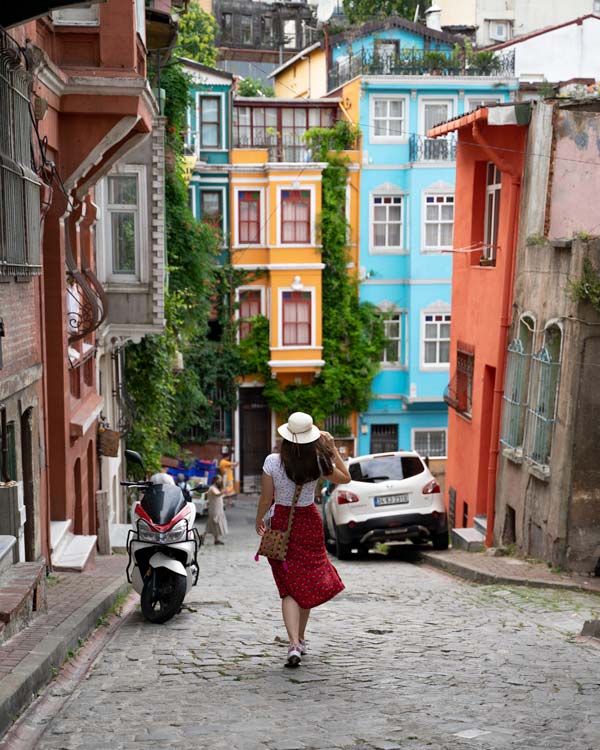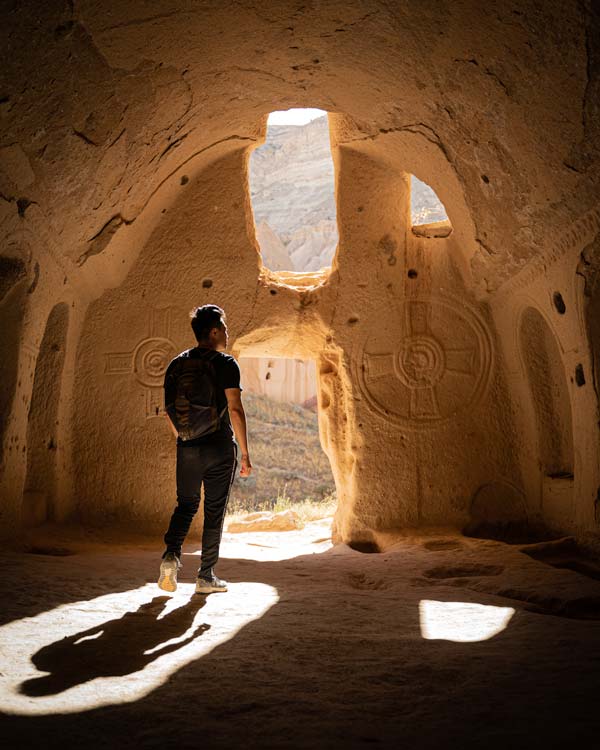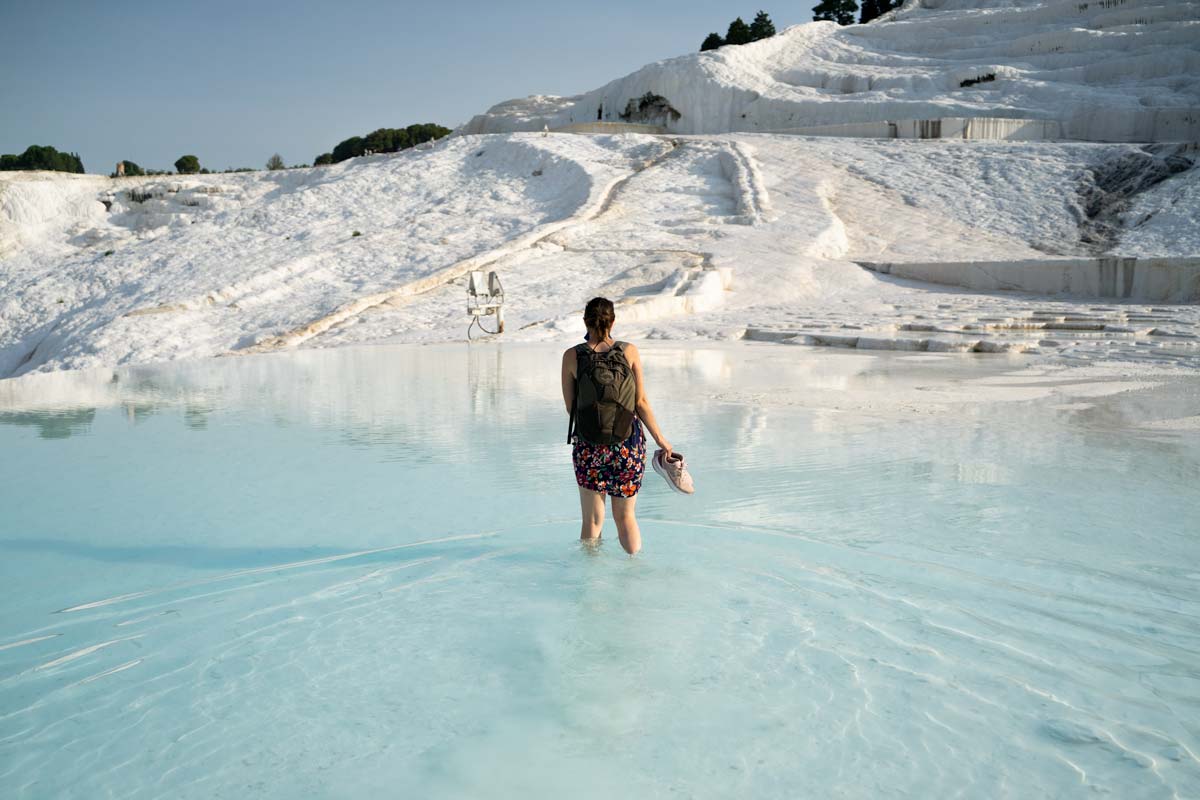One of the questions we often get asked is; what to wear in Turkey? Although it’s well known for its hot and humid climate and you might be tempted to pack your hot pants, Turkey is still mostly an Islamic country and this often causes people to wonder about what clothing is considered appropriate in order to not cause offence.
Although 94% of the Turkish population identify as Islamic, our experience interacting with the locals as tourists in Turkey has shown us that most people are quite liberal and are not usually offended by what tourists wear.
When planning your wardrobe for Turkey, you don’t have to worry too much as there is no strict dress code, though we do recommend you dress conservatively when visiting certain areas (which we will get into later).
But what does it mean to dress modestly and what is considered appropriate? How do you know what to pack for Turkey?
To help you out, we’ve created a complete guide to what to wear and shared a sample packing list for Turkey, so you can plan what to wear, as well as know what other important items you might need to bring for your trip.
Let’s begin with clothing…
What to Wear in Turkey
What you bring with you to wear in Turkey will largely depend on where in Turkey you are visiting. For those visiting Antalya or the Turkish Riviera, you’ll likely want to bring beachwear and some loose-fitted clothing for exploring the coastal towns.
Those visiting Istanbul and other major cities like Ankara will likely need more smart attire, sturdy footwear and casual clothing. Likewise, those planning on hiking in Cappadocia will need to pack some activewear and maybe some hiking boots in your suitcase.
To help keep things simple, here is a general list of clothing you will need to bring with you to Turkey.
1. Lightweight and breathable clothing for the hot summers


If you’re visiting Turkey in the summer, then you will want loose-fitted clothing that is breathable and comfortable when sweating.
You should avoid tightly fitted clothing anywhere in Turkey, especially for men, as it may violate the rules of modesty and privacy.
Additionally, for women, it is better to wear loose-fitting clothing that covers the shoulders and knees to show respect for local customs and traditions; especially when visiting cities. Although in beach towns, it’s fine to wear shorts and tank tops without causing any offence.
While there is no Turkey dress code, when wandering the streets, dressing immodestly can attract attention, especially in non-touristy towns. Generally, Central and Eastern Turkey are more traditional, and so you may want to adopt a conservative and more modest dress code when visiting these regions.
Dressing immodestly may mean you cannot enter certain places such as religious sites.
The dress code may also vary depending on the specific destination within Turkey and the cultural context.
If you’re not sure how to dress in Turkey as a tourist, just follow this simple rule: keep your shoulders, knees, and chest covered, and you’ll be fine.
2. A few long-sleeved shirts and lightweight pants for cooler evenings
Despite being a warm climate in general, Turkey does often have cool evenings, especially if you’re planning to visit Cappadocia which has a high elevation, making it much cooler in the evening.
You should pack a few long-sleeved cotton shirts just in case it gets cold during the evening.
3. Swimwear for beach destinations
Turkey is well known for its beaches, and so you’ll want to pack your swimwear when visiting the coast! When on the beach, you can wear a bikini, no problem. Some all-inclusive resort areas won’t mind your beach thongs or G-string bikinis (though do check the resort guidelines before booking), but you may turn a few heads if you wear your thong bikini to the beach.
You can wear normal beach attire such as a swimsuit or bikini to any beach, but do bring a shawl or wrap to cover up with when walking around the promenades or when leaving the beach.
When walking along promenades or visiting cafes, it’s best to put your street clothes back on before wandering in.
4. Comfortable walking shoes for exploring cities and archaeological sites
You’re likely to do a lot of walking in Turkey, so be sure to pack some comfortable shoes for walking. You don’t need walking boots, which is something we often get asked.
Even in hiking regions such as Cappadocia, you will find the trail is not too difficult and easy to do in sneakers. You may want to pack walking boots if you plan on doing any high-elevation hikes, but for general walking around, comfortable sneakers will suffice.
5. Sandals for beach and leisure time
If you plan to visit any beach destinations in Turkey, be sure to pack some sandals or flip-flops for the beach. The sand is often very hot under your feet, so you will want shoes to walk on the beaches.
Some beaches have rocky terrain, so you may even want to bring water shoes if you are planning to do a lot of swimming in the ocean.
6. A lightweight jacket or sweater for cooler nights or higher elevations
Depending on where in Turkey you are visiting, you may also want to bring with you a light jacket for evenings, especially in Cappadocia.
7. A hat or cap to protect yourself from the sun
When the sun is out, there is usually very little cloud cover, so be sure to pack a hat to protect your head from the exposed sun.
Wear sun protection and apply it regularly. Often in beach destinations, there is a cool sea breeze which makes you forget how hot it is, so do be mindful of this when visiting.
8. A rainproof jacket or umbrella, depending on the season
If you’re visiting in the winter, the likelihood of rain is quite high. Come prepared and bring a rain jacket or travel umbrella.
9. A headscarf for women
Most women are unsure of how to dress in Turkey, and many ask whether they need to wear a headscarf. You do not need to wear a headscarf when visiting Turkey unless you are visiting mosques or religious sites.
These are the only places where a headscarf is required, and often they will have one that you can purchase or rent on the door.
It’s a good idea to bring one with you, to avoid paying a fee to purchase one.
What To Wear When Visiting Mosques in Turkey
When visiting mosques, it is important to dress modestly and respectfully to adhere to local customs and religious practices.
For women, wear loose-fitting clothing that covers your entire body and avoid tight or revealing clothes. You can opt for a long skirt or pants that cover your legs fully, or at least extend over the knees.
Choose tops with sleeves that cover your shoulders and upper arms. Avoid sleeveless tops, tank tops or low-cut tops.
Consider wearing a lightweight cardigan to cover your shoulders and chest, and wear a shawl over your head to hide your hair. You don’t usually need to wear the scarf when exploring the outside of a mosque, only if you enter it.


For men, you also need to dress modestly. Wear long pants that cover your legs fully. Shorts are generally not recommended but some mosques will allow them if they cover your knees.
Choose a shirt or t-shirt with sleeves that cover your shoulders and upper arms. Avoid clothing with inappropriate or offensive messages or graphics.
It is common for both men and women to wear socks inside the mosque but shoes must be removed before you enter.
Avoid wearing excessive jewelry or accessories that may distract others during prayer.
Carry a large scarf or shawl in your bag in case you need to cover up further – some mosques may provide robes or scarves for visitors who are not adequately dressed.
What To Wear To The Beach In Turkey

When at the beach in Turkey, the attire is similar to any other beach destination, but you may want to cover up when wandering around the cities and towns.
We recommend you pack comfortable and lightweight shorts for both men and women. For women, you can wear shorts or skirts in most Turkish beach towns but try to avoid ones that are too revealing.
It is also more acceptable to wear tank tops or sleeveless shirts in beach destinations, though you may want to carry a shawl to cover up when you want to leave the beach and walk around the promenades.
It’s important to note that these recommendations are specifically for beach resorts and coastal areas in Turkey, and in resorts they will usually have their own rules and dress codes – so be sure to check with where you’re staying if they have their own rules.
What To Wear In Turkey By Season
The weather plays a big part in choosing what to wear in Turkey, so to help you out, here is a breakdown of what to wear by season.
Spring (March – May)

Spring tends to be warm but not hot, with cooler evenings and a few showers. You will want to pack for all weather conditions when visiting in these months. Here are some recommended clothing items we suggest you pack.
- Light layers such as long-sleeved shirts, cardigans, and light jackets for cooler mornings and evenings.
- T-shirts, blouses, or dresses for warmer afternoons.
- Jeans, trousers, or skirts paired with comfortable shoes for exploring.
Summer (June – August)

Summers can be stifling hot in Turkey and have very little rain or cloud cover. You will want to pack lightweight clothing and a lot of sun cream. Here are some essential clothing items you should bring when visiting Turkey in the summer…
- Lightweight and breathable clothing such as shorts, skirts, and t-shirts due to the hot temperatures.
- Dresses and loose-fitting tops made of breathable fabrics like cotton or linen.
- Swimwear and cover-ups for beach destinations.
- Sun hats, sunglasses, and sunscreen to protect from the intense sun.
Autumn (September – November)
The weather is still warm in the Autumn, though much cooler than in the summer. There is a good chance of rain in the Autumn and the evenings can also see cooler weather. Make sure you wear the following when visiting in the Autumn.
- Light layers such as long-sleeved shirts, sweaters, and jackets as temperatures cool down.
- Pants, jeans, or skirts paired with lightweight tops.
- Comfortable walking shoes or boots for outdoor activities.
- Scarves or shawls for cooler evenings.
Winter (December – February)
Winters can be cold and wet. In fact, it is also known to snow in Istanbul. Be sure to pack the following when visiting in the winter.
- Warm clothing including sweaters, coats, and jackets as temperatures can drop significantly.
- Long pants, jeans, or skirts paired with thermal tops or sweaters.
- Boots or closed-toe shoes to keep warm and dry.
- Hats, gloves, and scarves for added warmth.
Additional Packing List for Turkey
Aside from what to wear in Turkey, you’re probably wondering what else you need to pack. Here is a list of other items that you may need to add to your Turkey packing list.
Essential Items for Turkey
- Valid passport with at least six months remaining.
- A printed copy of your travel itinerary and accommodation details.
- Photocopy of important documents such as your passport.
- International driver’s license if you plan to rent a car.
- Any necessary visas or travel permits. Be sure to get your e-Visa online before you go.
- Travel insurance documentation.
- Local currency (Turkish Lira) or a credit/debit card for ATM withdrawals.
- Basic toiletries, including travel-sized shampoo, conditioner, toothpaste, and sunscreen.
- Medications and any necessary prescriptions.
- Insect repellent for outdoor activities.
- Suncream.
Read more: Do you have to carry your passport in Turkey?
Electronics
- Smartphone and charger.
- Digital camera or GoPro and necessary accessories.
- Portable power bank for charging devices.
- E-reader or tablet for reading during downtime.
- Headphones for listening to music or watching movies.
- A universal travel adapter or Turkey plug for charging devices.
Miscellaneous Items
- Travel-sized laundry detergent for washing clothes.
- Ziplock bags for storing snacks, keeping electronics dry, or organizing small items.
- Reusable water bottle to stay hydrated and reduce plastic waste. Tap water is usually safe to drink but doesn’t taste nice, so you might want a filtered water bottle.
- Earplugs and sleep masks for comfortable sleep.
- Travel pillow for long flights or bus rides.
- Portable luggage scale to avoid excess baggage fees.
- Travel lock for securing your belongings.
Optional Items
- Turkish phrasebook or language app to help communicate with locals.
- Snacks or energy bars for long journeys or when you’re on the go.
- Travel-sized sewing kit for minor repairs.
- Portable Wi-Fi device for staying connected while traveling.
- A travel journal or notebook to document your journey.
- Daypack or backpack for day trips and carrying essentials.
FAQs About What To Wear In Turkey
Here’s what people usually ask us about what to wear in Turkey…
How do women dress in Turkey?
Women in Turkey dress in many different ways. Some women will wear casualwear similar to what you see in Europe such as jeans and T-shirts, whereas other women may dress more traditionally. It’s common for Islamic women to wear clothing that covers their arms, chests, and legs, as well as hijabs, in Turkey – though tourists are not expected to if they are not Muslim.
What do female tourists wear in Turkey?
We recommend that female tourists to Turkey wear long, loose-fitted skirts, dresses, or trousers. Refrain from packing tight vest tops or tightly fitted clothing if you are not visiting the beach destinations, as these will likely cause some attention and may offend the locals in some regions.
Is Turkey strict in dress code?
There is no official dress code in Turkey but you will find that dressing immodestly will cause attention and may offend some locals in non-touristy areas. It will mean you cannot enter religious sites such as the Blue Mosque or Hagia Sophia.
Final Thoughts
So there you have it, this is what to wear in Turkey and essential things to pack! We hope you found this guide helpful and gave you some insight into what you need to take with you to Turkey.
Remember to check the weather forecast before your trip to pack accordingly. Additionally, consider the activities you’ll be doing and any specific requirements they may have.
